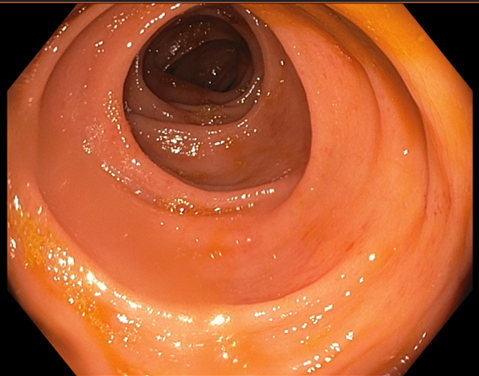Tuesday Poster Session
Category: Functional Bowel Disease
P5109 - Diarrhea with Depression: Sertraline-Induced Microscopic Colitis
Tuesday, October 28, 2025
10:30 AM - 4:00 PM PDT
Location: Exhibit Hall

Muhammad Gilani, MD
Marshfield Medical Center
Marshfield, WI
Presenting Author(s)
Muhammad Gilani, MD1, Ayesha Gilani, MD1, Muhammad Gilani, MD1, Saira Niazi, MBBS2
1Marshfield Medical Center, Marshfield, WI; 2University of Pennsylvania, Marshfield, WI
Introduction: Microscopic colitis (MC) is a rare chronic colitis of unknown etiology, associated with inflammation triggered by infections, toxins, or drugs. Studies show SSRIs, particularly sertraline, are high-risk for MC.
Case Description/
Methods: A 62-year-old female presented with 6 weeks of watery diarrhea and abdominal cramping. History included COPD, smoking, mood disorder, and remote gastric ulcers, H. pylori, and C. difficile. She reported 8-10 non-bloody, watery stools daily, with pain improving after defecation. 2 months ago, she had switched from duloxetine to sertraline 100mg for uncontrolled mood symptoms without psychiatric consultation. An exam showed a tender lower abdomen and hyperactive bowel sounds. Cologuard 2 years ago was negative. Labs on admission showed normal Hb, MCV 100.6, K+ 2.7, AST 46; WBCs, serum Mg, and lipid panel were normal. X-Ray abdomen and CTAP from 2 weeks ago ruled out acute pathology. Stool studies ruled out C. difficile and parasites. GI evaluation included a negative EGD and colonoscopy showing a colonic polyp(benign tubular adenoma), internal hemorrhoids, and a biopsy-proven MC and peptic duodenitis. H. pylori and dysplasia were ruled out. MC was attributed to sertraline, which was discontinued. She was treated with budesonide, cholestyramine, loperamide, and dicyclomine, and was discharged with GI and psychiatry follow-up. Complete resolution of symptoms was noted at 4 weeks.
Discussion: Drug-induced MC shows a temporal association with drug initiation, symptom onset, and improvement upon cessation. Although SSRIs are high-risk, only 3 prior cases of sertraline-induced lymphocyticand collagenous MC are reported.
MC presents with chronic watery diarrhea, incontinence, nocturnal symptoms, fatigue, and malnutrition. It typically affects middle-aged women and smokers. The diagnostic gold standard is a colonoscopy with biopsy. Treatment involves avoiding triggers and anti-inflammatory therapy, with budesonide as first-line.
Our patient's sertraline use, normal labs/stool studies, and chronic diarrhea raised concerns for drug-induced MC. Biopsy confirmed Lymphocytic Colitis. Per guidelines, sertraline was held, and budesonide, loperamide, cholestyramine, and dicyclomine were started. Symptoms resolved at 4 weeks.
Since sertraline is a commonly used and well-tolerated first-line agent for mood disorders, clinicians should suspect MC in patients with chronic diarrhea after starting it. Discontinuation and close follow-up to monitor for relapses are key to management.

Figure: Colonoscopy
Disclosures:
Muhammad Gilani indicated no relevant financial relationships.
Ayesha Gilani indicated no relevant financial relationships.
Muhammad Gilani indicated no relevant financial relationships.
Saira Niazi indicated no relevant financial relationships.
Muhammad Gilani, MD1, Ayesha Gilani, MD1, Muhammad Gilani, MD1, Saira Niazi, MBBS2. P5109 - Diarrhea with Depression: Sertraline-Induced Microscopic Colitis, ACG 2025 Annual Scientific Meeting Abstracts. Phoenix, AZ: American College of Gastroenterology.
1Marshfield Medical Center, Marshfield, WI; 2University of Pennsylvania, Marshfield, WI
Introduction: Microscopic colitis (MC) is a rare chronic colitis of unknown etiology, associated with inflammation triggered by infections, toxins, or drugs. Studies show SSRIs, particularly sertraline, are high-risk for MC.
Case Description/
Methods: A 62-year-old female presented with 6 weeks of watery diarrhea and abdominal cramping. History included COPD, smoking, mood disorder, and remote gastric ulcers, H. pylori, and C. difficile. She reported 8-10 non-bloody, watery stools daily, with pain improving after defecation. 2 months ago, she had switched from duloxetine to sertraline 100mg for uncontrolled mood symptoms without psychiatric consultation. An exam showed a tender lower abdomen and hyperactive bowel sounds. Cologuard 2 years ago was negative. Labs on admission showed normal Hb, MCV 100.6, K+ 2.7, AST 46; WBCs, serum Mg, and lipid panel were normal. X-Ray abdomen and CTAP from 2 weeks ago ruled out acute pathology. Stool studies ruled out C. difficile and parasites. GI evaluation included a negative EGD and colonoscopy showing a colonic polyp(benign tubular adenoma), internal hemorrhoids, and a biopsy-proven MC and peptic duodenitis. H. pylori and dysplasia were ruled out. MC was attributed to sertraline, which was discontinued. She was treated with budesonide, cholestyramine, loperamide, and dicyclomine, and was discharged with GI and psychiatry follow-up. Complete resolution of symptoms was noted at 4 weeks.
Discussion: Drug-induced MC shows a temporal association with drug initiation, symptom onset, and improvement upon cessation. Although SSRIs are high-risk, only 3 prior cases of sertraline-induced lymphocyticand collagenous MC are reported.
MC presents with chronic watery diarrhea, incontinence, nocturnal symptoms, fatigue, and malnutrition. It typically affects middle-aged women and smokers. The diagnostic gold standard is a colonoscopy with biopsy. Treatment involves avoiding triggers and anti-inflammatory therapy, with budesonide as first-line.
Our patient's sertraline use, normal labs/stool studies, and chronic diarrhea raised concerns for drug-induced MC. Biopsy confirmed Lymphocytic Colitis. Per guidelines, sertraline was held, and budesonide, loperamide, cholestyramine, and dicyclomine were started. Symptoms resolved at 4 weeks.
Since sertraline is a commonly used and well-tolerated first-line agent for mood disorders, clinicians should suspect MC in patients with chronic diarrhea after starting it. Discontinuation and close follow-up to monitor for relapses are key to management.

Figure: Colonoscopy
Disclosures:
Muhammad Gilani indicated no relevant financial relationships.
Ayesha Gilani indicated no relevant financial relationships.
Muhammad Gilani indicated no relevant financial relationships.
Saira Niazi indicated no relevant financial relationships.
Muhammad Gilani, MD1, Ayesha Gilani, MD1, Muhammad Gilani, MD1, Saira Niazi, MBBS2. P5109 - Diarrhea with Depression: Sertraline-Induced Microscopic Colitis, ACG 2025 Annual Scientific Meeting Abstracts. Phoenix, AZ: American College of Gastroenterology.
